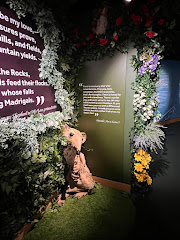Today was one of the days that I have been so excited for because we got to tour Shakespeare's Globe! (Don't let the name be deceiving, they put on other plays that are not written by Shakespeare.) We began by looking at a new exhibition the Globe has going on, and it is all about Shakespeare's past as well as the history of the theatre. I really enjoyed going through it because it was interactive! They had tiny boxes all containing smells of the Borough Market - which I learned in the oldest fruit and vegetable market in London! They also had noise machines that were similar to how sound effects would have been produced back in Shakespeare's time such as wind storms and thunder. I find it super cool to learn about London's history dating back to the seventeenth-century and seeing what is still around today.
Inside the exhibition
It is always incredibly rewarding to experience similar places to what famous names from history have experienced, as well as hear stories about what may have happened years before. When touring the Globe (though not the original or second Globe) I was able to learn a lot about how and why it was built that way, and how each decision was made to attempt continuity with the original Globe. From the walls being made out of goat hair, the thatched roof aligning with the original Globe, and both the flat and round pillars on the balconies - I was amazed.
The Globe staged for Much Ado About Nothing
Though in the seventeenth-century there were no women acting on the stage of the Globe, I was very happy to hear that the first lines performed on the stage of the new Globe in 1997 were spoken by a woman. There is so much history within one structure. I particularly enjoyed learning the history of plays censorship in the seventeenth-century. Similar to what we read in our class readings, the monarchs were particular about what could have been said on stage during performances, as there was the fear of rebellion and violence. Due to that a lot of Shakespeare's plays - along with other play writers - could not write plays containing negative thoughts or actions towards the monarchy. I cannot imagine being Shakespeare and having to censor the plays that I am writing and how difficult that must be. It is no secret that a lot of Shakespearean plays relate to what was going on at that time and were written to appeal to certain audiences.

Picture taken within the exhibition.
I have tons of thoughts about todays experience, but my two questions today are:
1) I wonder if the strict censorship was a constant problem for Shakespeare and other play writers throughout their careers. How did they work around this? Did it interfere with the stories they wanted to tell? Did the common folk understand any hidden innuendos that Shakespeare may have written in his plays?
2) Had the first two Globe's not burned down, would it still be standing today or would it have been destroyed years ago? If it had been destroyed I wonder if it would have been rebuilt quickly. Though the Globe is a major historic site for tourists, do London locals visit it often? Would the Globe remain a huge historic site had it not burned now and stayed the original first structure?



Comments
Post a Comment